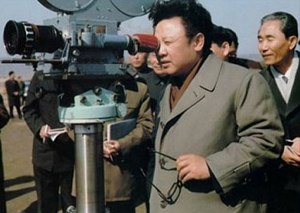Kim Jong-il's Tasteless Cinematic Legacy: In Memoriam
 Kim Jong-il, the reclusive North Korean leader who died Sunday at age 69, was a tyrant, a thug, a meddler, a menace, a fanatic, a spendthrift, a dilettante, and a dangerous visionary responsible for some of the worst abuses witnessed by world civilization in the last half century. But enough about his movies.
Kim Jong-il, the reclusive North Korean leader who died Sunday at age 69, was a tyrant, a thug, a meddler, a menace, a fanatic, a spendthrift, a dilettante, and a dangerous visionary responsible for some of the worst abuses witnessed by world civilization in the last half century. But enough about his movies.
The awfulness of Kim's regime -- its human-rights transgressions, its warmongering, its political ruthlessness -- obviously cannot be overstated, and anyone who's seen such bracing nonfiction fare as Yodok Stories (about DPRK concentration camp refugees who stage a musical about their lives), Kimjongilia (about surviving under the Dear Leader's oppressive thumb) or The Red Chapel (about Kim's sociocultural stranglehold on Pyongyang) knows full well about the nightmare that is life above the 38th Parallel. His horrors and quirks made him an easy target for such infamous parodies as those filling Team America: World Police, yet it's also worth substituting millions of men, women and children for "Arec Bardwin" in this clip for some leavening historical perspective:
And once you've got that out of the way, let's reflect on that time when Kim -- a notorious cinephile who had put an international assortment of filmmakers and other "cultural consultants" (read: political prisoners) to work as DPRK propagandists (several of whom wound up committing suicide) -- kidnapped South Korean filmmaker Shin Sang-ok and his ex-wife Choi Eun-hee. Their mission: Help Kim establish North Korea as a force in world cinema. They did exactly that with Pulgasari, quite possibly the worst monster movie in the history of a genre absolutely choked with awful films. Though, as with so many of the country's most memorable cultural contributions over the years (Mass Games and magic shows come to mind) it's a little more complicated than that:
Despite Shin's internal turmoil (or perhaps because of it), the director does have a few standouts from this phase in his career. Among them is Pulgasari, a Godzilla-esque film some suspect was meant as a slam to the cult of personality surrounding Kim Jong Il's father as well as a veiled depiction of Shin's feelings about his egomaniacal taskmaster. Fortunately, Kim loved it, largely because he interpreted the flick as an outright critique of capitalism.
Even from beneath a pile of accolades and money, Shin and Choi couldn't stop dreaming of escape. In fact, their "Dear Leader" was building them a mansion and a Hollywood-worthy movie set when the couple went to Vienna to negotiate film distribution rights in 1986. There, Shin and Choi eluded their bodyguards, fled to the American embassy, and pled for asylum. Discussions they'd secretly taped with their executive producer were used as proof that they hadn't gone to North Korea for fame and fortune (as they'd been forced to claim during press conferences), and they were allowed to return home to South Korea. Shin passed away in 2006, at the age of 79.
Kim Jong Il had to go back to relying on homegrown talent to crank out roughly 60 movies a year, but he never achieved his dream of winning an international audience. Regardless, as of 2006, a sign outside the country's Ministry of Culture read, "Make More Cartoons"--proof that Kim Jong Il continued to impart his wisdom, and influence, on North Korean filmmakers.
Here's a glimpse at Pulgasari, for which I apologize in advance:
And then there was Kim's utterly vapid On the Art of Cinema, a 1973 book that served as both a motivational text for North Korea's stillborn movie industry and a film-theory curio that no doubt just got a lot harder to find on Amazon. Among the "insights" therein:
The cinema is now one of the main objects on which efforts should be concentrated in order to conduct the revolution in art and literature. The cinema occupies an important place in the overall development of art and literature. As such it is a powerful ideological weapon for the revolution and construction. Therefore, concentrating efforts on the cinema, making breakthroughs and following up success in all areas of art and literature is the basic principle that we must adhere to in revolutionizing art and literature.
I mean, sure? I still prefer Sidney Lumet's Making Movies 10 times out of 10, but maybe I'm missing something.
In any case, we are left now with Kim's son, Kim Jong-un, whose first economic policy effort as the DPRK's new leader will no doubt be to find a buyer for his dad's rumored collection of 20,000 DVDs. After all, the country needs all the GDP boost it can get, and to hear experts tell it, the kid's more of "Watch Instantly" guy anyway. Good riddance to one and all.

Comments
I would like to get a full list and a price quote on Kim Jong-il's collection of 20,000 DVDs. But please leave out the Godards. I already have those.